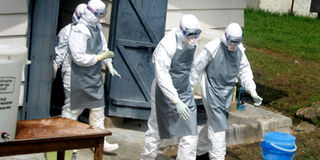Uganda launches Ebola vaccine trials

Late Health minister Stephen Mallinga (2nd R) accompanied by Commissioner of Health Sam Okware (R) and other experts emerge out of an Ebola isolation ward at Bundibugyo Hospital in 2007. FILE Photo
What you need to know:
Purpose. The principal investigator says the research is aimed at understanding how safe and tolerable the vaccines are among Ugandan adults.
Kampala.
The head of Makerere University Walter Reed Project (MUWRP), Dr Hannah Kibuuka, on Friday revealed that Ebola vaccine trials involving more than 90 participants living in Kampala are expected to start after a fortnight.
According to Dr Kibuuka, who also doubles as the principal investigator in the Ebola vaccine study coded RV 442, the research is aimed at understanding how safe and tolerable the vaccines are among Ugandan adults. The trial will also establish whether the vaccines are able to stimulate the body to defend itself against Ebola virus.
“We hope to start vaccination in the next two weeks but we are currently providing information to those who may be interested in participation and screening potential participants to determine those that are eligible for vaccination,” Dr Kibuuka said at media briefing in Kampala.
She added that two experimental vaccines known as the ‘chimpanzee Adenovirus 3 vectored vaccines’ containing glycoproteins for both the Zaire and Sudan strains are to be used in the trials.
Dr Kibuuka noted that the Sudan and Zaire strains commonly cause Ebola outbreak. The Zaire strain is the cause of the biggest and most recent Ebola outbreak in West Africa.
“These vaccines are for immune response such that if an infection occurs, the body is able to defend itself against the virus,” Dr Kibuuka explained, adding that the vaccines do not contain the Ebola virus and cannot cause the Ebola disease among those who will be vaccinated.
However, Dr Kibuuka observed that the two experimental vaccines are not aimed at preventing Ebola.
She added that a total of 90 consenting male and female participants aged between 18 and 65 years will be enrolled for vaccination where each of them will receive a single injection and will be monitored for one year.
Thirty of the respondents will be picked from those who participated in an earlier Ebola and Marburg DNA vaccination trial conducted by the Makerere Walter Reed Project between 2009 and 2012, whereas 60 participants will be new entrants on the study.
Commenting on the criteria, Dr Kibuuka observed that the participants should have a good medical and physical history and must consent before being enrolled.




